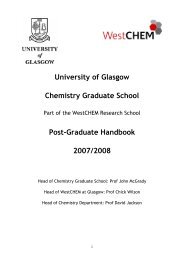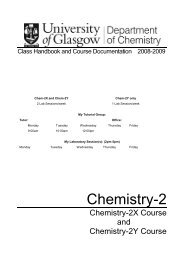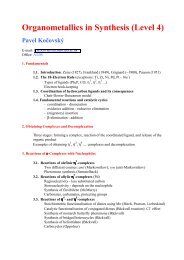Chemistry Study [PDF] - University of Glasgow
Chemistry Study [PDF] - University of Glasgow
Chemistry Study [PDF] - University of Glasgow
You also want an ePaper? Increase the reach of your titles
YUMPU automatically turns print PDFs into web optimized ePapers that Google loves.
<strong>Chemistry</strong> borders on physics, geology, engineering and<br />
electronics and also with genetics, pharmacology and other<br />
biological sciences, giving chemists excellent job prospects.<br />
www.glasgow.ac.uk/chemistry<br />
Degree combinations<br />
The following degree combinations are<br />
designed to produce graduates who specialise<br />
in theoretical chemistry.<br />
<strong>Chemistry</strong> & Mathematics and<br />
<strong>Chemistry</strong> & Applied Mathematics<br />
Degree: BSc, MSci<br />
In the first two years <strong>of</strong> these degree<br />
programmes you will study mathematics and<br />
chemistry.<br />
If you successfully complete the courses in<br />
first and second years, you may progress to<br />
Honours. The third and fourth years involve<br />
half <strong>of</strong> the <strong>Chemistry</strong> Level-3 and 4 courses<br />
with an equal emphasis on organic, physical<br />
and inorganic chemistry, together with half <strong>of</strong><br />
either the Mathematics or Applied Mathematics<br />
material.<br />
It is possible to do an MSci in this subject<br />
involving a total <strong>of</strong> five years. You study<br />
material taken from the corresponding MSci<br />
degree programmes.<br />
Biology & <strong>Chemistry</strong><br />
Degree: BSc<br />
This is a three-year BSc. This programme is<br />
designed to give you training in both chemistry<br />
and biology suitable for taking a postgraduate<br />
degree in teaching both these subjects.<br />
In the first two years you study chemistry and<br />
biology. In third year you take selected parts<br />
<strong>of</strong> the biochemistry and chemistry degree<br />
programmes.<br />
The MSci Degree<br />
MSci placement degrees are <strong>of</strong>fered in:<br />
• <strong>Chemistry</strong><br />
• <strong>Chemistry</strong> with Medicinal <strong>Chemistry</strong><br />
• <strong>Chemistry</strong> with Forensic Studies<br />
• Chemical Physics.<br />
These are five-year degrees. Your fourth year<br />
is spent on placement either in industry, a<br />
research institute or in a European university. For<br />
an industrial placement you will do a research<br />
project supervised by both an industrial and<br />
academic supervisor. A wide range <strong>of</strong> industries<br />
take placement students both here and abroad.<br />
The European placements can be in France,<br />
Germany, Spain, Holland, Italy or the Czech<br />
Republic.<br />
You will write a report on your placement year,<br />
which is assessed as part <strong>of</strong> your final degree<br />
classification. You will also give a presentation<br />
on your placement to the department when<br />
you return in fifth year.<br />
In the year before going on placement you will<br />
be given additional training in the following<br />
topics:<br />
• Applying for placements<br />
• Intellectual property and ethics<br />
• Presentation skills<br />
• Biotransformations<br />
• Frontiers <strong>of</strong> crystallography<br />
• Protein structure.<br />
The final year <strong>of</strong> the MSci programme involves<br />
advanced topics, many <strong>of</strong> which are separate<br />
from the BSc Honours final year lectures. MSci<br />
students also do a longer and more advanced<br />
final year research project.In the fifth year the<br />
MSci courses you will take include:<br />
• Processing chemical data<br />
• Heterogeneous catalysis<br />
• Enzyme catalysis in organic chemistry<br />
• Supramolecular architecture and self<br />
assembly<br />
• Reactivity <strong>of</strong> organometallic compounds<br />
• Asymmetric synthesis<br />
• Nmr spectroscopy<br />
• Concepts <strong>of</strong> electronic structure.<br />
The option courses for MSci students are<br />
currently:<br />
• Inorganic materials design<br />
• Organometallics in synthesis<br />
• Modern techniques in surface science<br />
• Photosynthesis<br />
• Advanced retrosynthesis<br />
• Molecular magnetism<br />
• Protein structure and engineering<br />
• Total synthesis <strong>of</strong> natural products<br />
• Applications <strong>of</strong> synchrotron radiation.<br />
Can I study abroad?<br />
The <strong>University</strong> has an extensive range<br />
<strong>of</strong> student exchange programmes with<br />
universities in Europe, North and South<br />
America, Canada and Australia. If you opt to<br />
study for an MSci, your placement year can<br />
be taken abroad.<br />
<strong>Study</strong>ing in Europe<br />
You can study at more than 250 universities<br />
all over Europe under the Erasmus<br />
programme. Erasmus is an EC exchange<br />
programme that enables students in 31<br />
European countries to study for part <strong>of</strong><br />
their degree in another European country.<br />
Exchanges can last from 3-10 months and<br />
study credit is transferred to your home<br />
university.<br />
Beyond Europe<br />
The International Exchange Programme allows<br />
you to spend a year at institutions in Australia,<br />
Canada, Central & South America, Hong<br />
Kong, Japan, Korea, New Zealand, Singapore<br />
and the USA. All the institutions teach in<br />
English except Chuo <strong>University</strong> in Japan and<br />
those in Central & South America.<br />
The <strong>University</strong> holds a <strong>Study</strong> Abroad<br />
Fair every November. Information is<br />
also available on our website:<br />
www.glasgow.ac.uk/studying/exchange<br />
Where can I find out more?<br />
Our website has information about our<br />
department and all <strong>of</strong> the chemistry-related<br />
degrees we <strong>of</strong>fer: www.glasgow.ac.uk/<br />
chemistry<br />
If you have any questions about any aspects<br />
<strong>of</strong> our programmes you can send them to:<br />
ug-enquiries@chem.gla.ac.uk


![Chemistry Study [PDF] - University of Glasgow](https://img.yumpu.com/26854063/5/500x640/chemistry-study-pdf-university-of-glasgow.jpg)
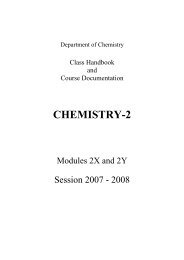

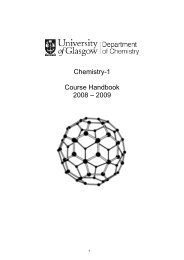
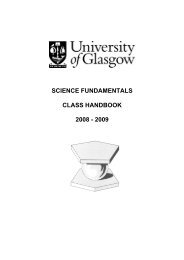
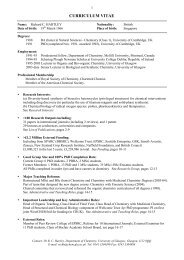
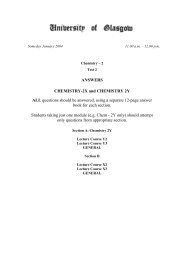
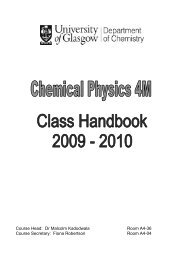

![Environmental Chemistry Study [PDF] - University of Glasgow](https://img.yumpu.com/26854018/1/184x260/environmental-chemistry-study-pdf-university-of-glasgow.jpg?quality=85)

